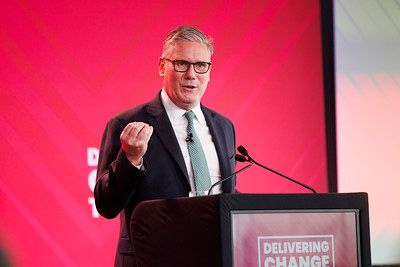
Written by:
Caron Bradshaw
Article read time:
2 minutes
CEO, Charity Finance Group
Caron joined CFG as CEO in 2010 from the ICAEW. She was appointed Chair of Impress, the independent Monitor of the Press, in May 2025. Caron is also a non-executive director of the Lending Standards Board, a trustee of The Wollstonecraft Society, and a Member of Court of Governors at University of Westminster, where she is an alumna. Caron also sits on The British Asian Trust’s Finance and Risk Committee.
In the past, Caron has been a member of the NCVO’s National Assembly and the Charities SORP Committee, has sat on a number of government working parties, was a former member of the Church of England Pension Board’s Audit and Risk Committee, and is the former Chair of the Board of the Directory of Social Change (and her local hockey club!). Caron was honoured with an OBE for 'services to charity' in the New Year's Honours list 2021.
CFG’s CEO, Caron Bradshaw, recently attended the launch of the Civil Society Covenant alongside other sector leaders. Here she outlines her thoughts on the day and the covenant itself.

I was privileged to represent CFG at the Civil Society Summit on Thursday 17 July. You might recall that pre-election the Labour party hosted a similar summit for which the shadow cabinet and key MPs turned out in force to show that they wanted to work in partnership with the sector.
Now in Government, some 16 months later, it is clear that they want to show again how they are different from what came before and that they wish to work in partnership with civil society. We again had major MPs and senior members of the Cabinet turning out to repeat how important working with our sector is to the delivery of the government's agenda.
Of course, we need actions, not just warm words, but I genuinely cannot remember a time, including the days of the Big Society, where such governmental resources were committed to the sector and so many invitations made to push on 'open doors'.
The summit marked the launch of the covenant - a reset of the relationship between state and sector. It isn't perfect, but it has been drafted with the input of many colleagues across the sector. As I commented last week, it would be easy to be sceptical about this covenant and to think that we've been here before with statements of intent.
However, I think we have to look forward and not back. It's incumbent on the sector to give it a chance and match the commitments of Government to work differently.
The PM also launched a new local covenant partnership programme which will aim to see this work at a local level. The covenant can be read in full here, but as a brief overview, it sets out how the government and the sector should be working together across England and Wales. It is intended to be a guide star for us all in working collaboratively.
The Prime Minister also launched 'diagnosis connect' which will be an NHS app that highlights/refers to relevant specialist charities when a patient is diagnosed with a condition. This could drive significant work to charities and, of course, it will be important that it is properly resourced.
Several other sector-based initiatives that the Government is engaged with, like the rolling out of a civil society initiative to scale up and address domestic abuse in their commitment to address violence against women and girls, were referenced.
It was good to hear the Secretary of State for DCMS say that civil society must be at the heart of change and not on the fringes. It was also genuinely moving to listen to some of the civil society stories showcasing the best of what the sector can achieve.
It’s positive to see the introduction of Task and Finish groups to support the implementation of the covenant. Likewise, the establishment of a new civil society forum to enable dialogue between civil society and HMT is to be welcomed. We hope that these steps will allow the covenant to deliver genuine improvements not just for the sector, but for society as a whole.